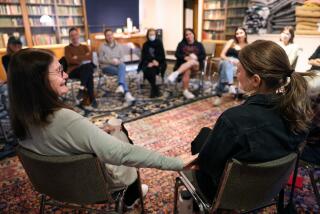Who Will Have the Last Word on Death With Dignity?
Over the last decade, California voters have been asked to pass judgment on ballot initiatives hideously varied and complex. We have been asked to decide whether to rewrite our system of property taxation and our criminal code, and how best to regulate nuclear energy and auto insurance.
But we never have had thrust upon us a decision as knotty and far-reaching as that demanded by Proposition 161, the so-called Death With Dignity Act. If it passes, that measure would make California the world’s first political entity to empower physicians to legally end the lives of terminally ill people who request such assistance or to give them the means to commit suicide. Not even the Netherlands, which has the Western World’s most permissive attitude toward euthanasia, goes quite that far.
It’s difficult to imagine a question less suited to resolution by a system where success or failure usually is determined by which side has the most money for television commercials and the most cunning electoral strategy. Yet that is precisely how it will be decided. Lines are being drawn; sides are being taken.
The leading proponents are respected advocates of civil liberties--the ACLU and the National Organization for Women--as well as the Hemlock Society. The latter group’s morbid preoccupation with suicide and financial interest in promoting it ought to raise questions in the minds of skeptical voters.
The strongest opponents are the state’s leading medical organizations--the California Medical Assn., the California Nurses Assn., the Southern California Hospital Council and the American Cancer Society--as well as the Catholic Church. Its particularly ham-fisted intervention in this debate--special collections during Mass and voter registration drives on the church steps--simply has muddied the waters by raising legitimate questions of church-state separation.
Both sides are gearing up for an eleventh-hour advertising blitz.
In such a climate, the first thing to be lost will be those quiet, tentative voices of firsthand experience to which we all ought to attend in this delicate matter. I spoke with two such people, both friends who have been called upon during the last year to deal with the assisted deaths of terminally ill loved ones.
Helen, a health-care professional, was the wife of a close friend, a man with whom I carried on a deep and rewarding conversation over the course of years. Despite a profound physical disability, he was distinguished professional, an influential writer and teacher. Ultimately, though, the disease that had crippled him reasserted itself. In pain, unable to carry on the work he loved, he ended his life with the help of sympathetic friends.
I had not spoken with Helen (I am not using her real name) in several months, and I asked her this week how she now feels about her husband’s decision and its impact on her life.
“To tell you the truth,” she said, “I feel as if I’m living a lie of sorts. That’s not only because I’m unable to discuss openly what happened, but also because, inevitably, you feel such anger at this individual and his selfishness.
“Toward the end, he used to say to me, ‘You know, you have to have something to wake up to.’ I always wanted to answer, ‘You do have something to wake up to--me.’
“When he was terribly ill and panicky about it, he’d say, ‘I just can’t handle this, you’ve got to help me.’ But I’d say, ‘No, not tonight. I can’t deal with it tonight.’ Then, I’d go out into the road to cry. He knew I couldn’t do it for him, that he’d have to ask someone else. And, ultimately, that’s what he did.
“I used to think that his passing would be a graceful one, if only he’d hang in there. But maybe that was just wishful thinking on my part. Anyway, I’m going to vote against 161. I don’t like its lack of safeguards and the way it lowers our inhibitions against taking human life. I’m a Catholic. My husband wasn’t. But I don’t think it’s my Catholicism talking, I think it’s what I know about the society we live in and how easily it devalues what ought to be treasured. As my own experience shows, it isn’t as if decisive people, like my husband, can’t find the help they feel they need now.
“People were so fond of my husband that they hated to let go of him. But, at the end, he saw himself as a burden to us all. He hated that, and he said he had come to hate his own body. The strange thing is that, after he was dead, his total disability hit me with a force I’d never experienced before. You didn’t notice any of that when he was alive and that’s why being alive is important.”
On the matter of burdens, Bob (I am not using his real name, either) and Helen, who never have met, have common ground. He is a lawyer and a gay man. Earlier this year, his lover, Ian, terminally ill with AIDS, was assisted in his suicide by Bob and a physician friend. Ian, a free-lance graphic artist, quickly lost his his meager health insurance. Bob, who held title to their Hollywood Hills home, took a loan against his equity to cover Ian’s medical bills. When that was gone, he began to sell things.
“I sold a painting and some art pottery we had,” he says. “Ian loved those things, and when he realized they were gone, he knew what I was doing. He felt like an albatross around my neck. He said, ‘I won’t let you ruin yourself and everything you’ve worked so hard for just for me. I’m going to die anyway.’ I think that’s why he killed himself--over a painting and some pots. But, you know, I loved him more than any of those things.
“I go back and forth about 161. Sometimes, I think it would be good to have all this out in the open, without any stigma. Then, I think of Ian and all the other people I know with AIDS. If euthanasia is the norm, why not put them all out of their misery? After all, they’re all going to die anyway. The problem is, what they want to do is put themselves out of what they think is our misery. But the truth is, I’d endure anything, give all I have, to have him back for just one day. It still hurts me that he didn’t understand that.”
More to Read
Get the L.A. Times Politics newsletter
Deeply reported insights into legislation, politics and policy from Sacramento, Washington and beyond. In your inbox three times per week.
You may occasionally receive promotional content from the Los Angeles Times.










